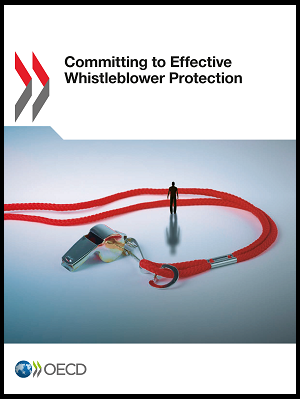Whistleblower protection
Encouraging employees to report wrongdoing and to protect them when they do, is essential for corruption prevention in both the public and private sectors. Employees are usually the first to recognise wrongdoing in the workplace. Empowering them to speak up without fear of reprisal can help authorities both detect and deter violations.
In the public sector, protecting whistleblowers can make it easier to detect passive bribery, the misuse of public funds, waste, fraud and other forms of corruption. In the private sector, it helps authorities identify cases of active bribery and other corrupt acts committed by companies, and also helps businesses prevent and detect bribery in commercial transactions.
Whistleblower protection is essential to safeguard the public interest and to promote a culture of public accountability and integrity.
Committing to Effective Whistleblower Protection
This report analyses whistleblower protection frameworks in OECD countries, identifies areas for reform and proposes steps to strengthen whistleblower protection laws in both the public and private sectors.
 |
The role of whistleblowers and whistleblower protection in the detection of foreign bribery
This report, originally published in the OECD study on The Detection of Foreign Bribery, looks at the key role that whistleblowers and whistleblower protection can play in the detection of foreign bribery when legal frameworks and appropriate channels are in place to report alleged instances to law enforcement authorities.
Further information
- Technical Report on Whistleblower Protection in the Public Sector | In Greek (OECD, 2018)
- Guidelines for Reporting Misconduct in the Public Sector | In Greek (OECD, 2018)
- Guidelines on Whistleblower Protection for Companies in Greece l in Greek (OECD, 2018)
- Anti-Bribery Ministerial Meeting (2016) - This event featured a session on empowering whistleblowers and facilitating voluntary disclosure.
- Resource Guide on Good Practices in the Protection of Reporting Persons (UNODC, 2015)
- Update on public and private whistleblower protection, OECD at CoSP6 in St Petersburg, 3 November 2015
Stay updated
Reports
See our country reports, comparative evidence and analysis of international practices: